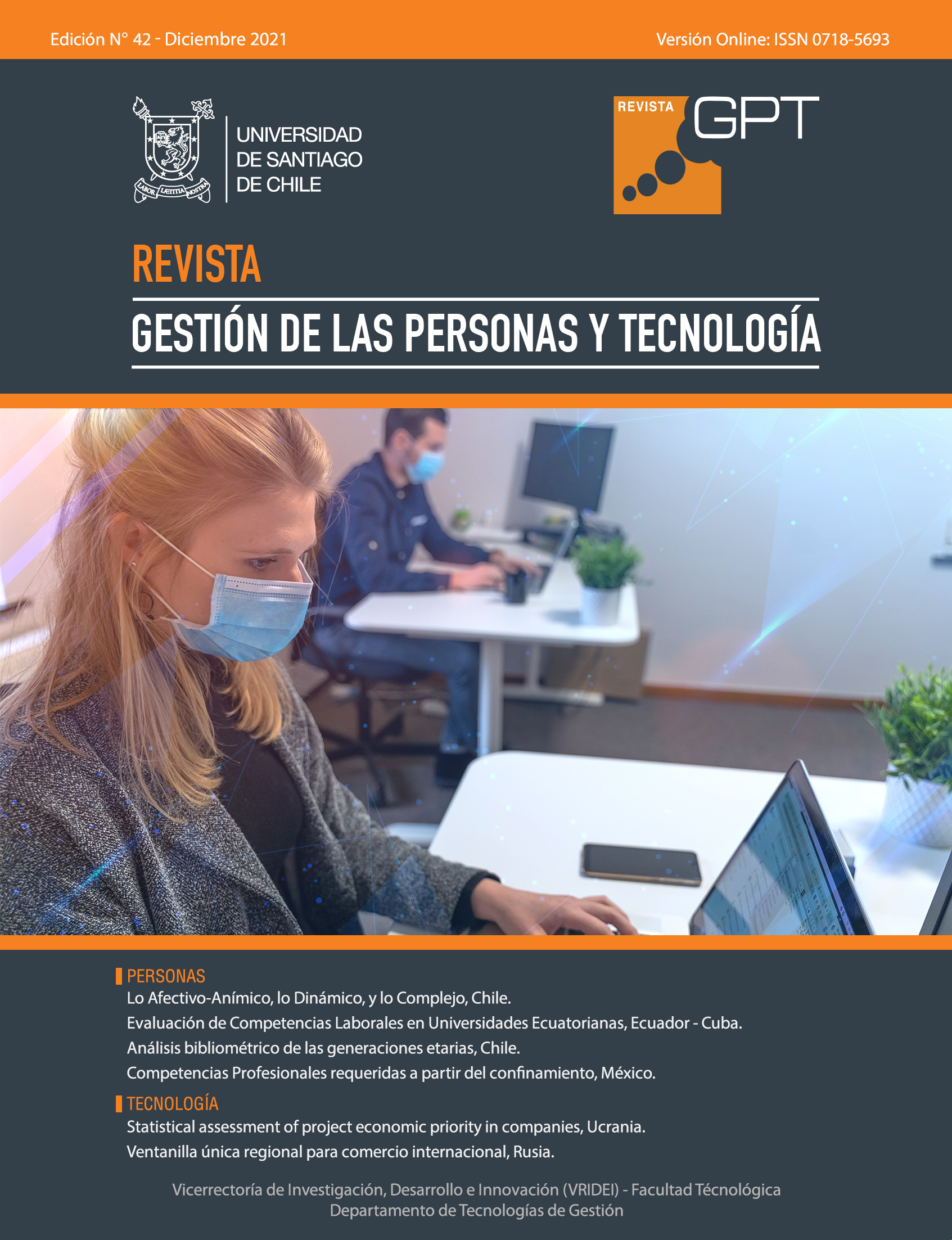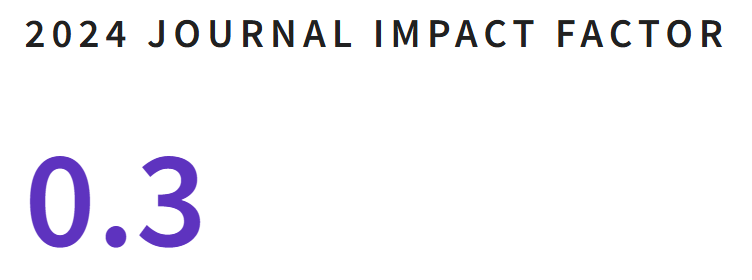Bibliometric analysis of age generations
DOI:
https://doi.org/10.35588/gpt.v14i42.5282Keywords:
Age generations, work behavior, human resources management, bibliometric studiesAbstract
This research aimed to show how scientific production has developed on age generations at work, the scientific production that was used was indexed in the Scopus and Web of Science databases. The methodology used was bibliometric with data from 2000 to April 2021, using the Bibliometrix program for the analysis of 485 documents, distributed in journals, articles, papers, editorial, letters, notes, reviews and short interviews. The analyzes carried out were to the annual scientific production, the sources, the authors and the documents. It could be concluded that scientific production is very low, even though it has been increasing over time, the sources that have contributed more studies on the subject are related to the health area, most of the authors work together and the most relevant documents are published in both databases.
Downloads
References
ADP Research Institute (2021, Abril 27). People at work 2021:A global workforce view. https://www.adpri.org/assets/people-at-work-2021-a-global-workforce-view/
Álvarez, P. (30 de junio de 2016). La generación Z toma el relevo a los millennials. https://www.proquest.com/docview/1761269122/abstract/32F0202C3FA74E47 PQ/1
Ancin, I. (2018). Relación de las características de las generaciones “ X ” Y “ Z ” con las decisiones de selección de personal y su desarrollo laboral. Revista Caribeña de Ciencias Sociales. https://www.eumed.net/rev/caribe/2018/04/generacinesxy-desarrollo-laboral.html
Antunes Silva, R., Macedo dos Santos, R. N. & Schwarz Rodrigues, R. (2011). Estudo bibliométrico na base LISA: um enfoque nos artigos sobre os surdos. Em Questão,17(1), 289-304. https://repositorioslatinoamericanos.uchile.cl/handle/2250/2173475
Ardanuy, J. (2012). Breve introducción a la bibliometría. Universitat de Barcelona. https://diposit.ub.edu/dspace/bitstream/2445/30962/1/breve%20introduccion%20bibliometria.pdf
Aria, M. & Cuccurullo, C. (2017). bibliometrix: An R-tool for comprehensive science mapping analysis. Journal of Informetrics, 11(4), 959–975. https://doi.org/10.1016/j.joi.2017.08.007
Barreto. J.A., Gutierrez-Alemán, H. & Venegas-García, R. M. (2019). Desafíos y transformaciones en las organizaciones y la gestión humana en el marco de la revolución 4.0. Revista Electrónica Gestión de las Personas y Tecnología, 12(36), 22-32. https://www.revistas.usach.cl/ojs/index.php/revistagpt/article/view/4257/26003320
Battista, A., Cabrera, L. & Villanueva, F. (2014). Demandas laborales de la Generación Z. Universidad Argentina de la Empresa. https://repositorio.uade.edu.ar/xmlui/handle/123456789/2423
Bickel, J. & Brown, A. J. (2005). Generation X: implications for faculty recruitment and development in academic health centers. Academic Medicine : Journal of the Association of American Medical Colleges, 80(3), 205–210. https://doi.org/10.1097/00001888-200503000-00003
Burnham, J. F. (2006). Scopus database: a review. Biomedical Digital Libraries, 3(1), 1-8. https://doi.org/10.1186/1742-5581-3-1
Cennamo, L. & Gardner, D. (2008). Generational differences in work values, outcomes and person-organisation values fit. Journal of Managerial Psychology, 23(8), 891–906. https://doi.org/10.1108/02683940810904385
Cervetti, M.P. (2014). Conflictos por la convivencia de baby boomers, generación X y generación Y en los equipos de trabajo : equipos de auditoría de Deloitte. Repositorio Institucional Universidad de San Andrés. https://repositorio.udesa.edu.ar/jspui/handle/10908/10834
Chirinos, N. (2009). Características generacionales y los valores. Su impacto en lo laboral. Observatorio Laboral Revista Venezolana, 2(4), 133–153. https://www.redalyc.org/pdf/2190/219016846007.pdf
Chiuzi, R. M., Goncalves-Peixoto, B. R. & Lorenzini-Fusari, G. (2011). Conflito de gerações nas organizações: um fenômeno social interpretado a partir da teoria de Erik Erikson. Temas Em Psicologia, 19(2), 579–590. https://www.redalyc.org/comocitar.oa?id=513751438018
Choudhri, A. F., Siddiqui, A., Khan, N. R. & Cohen, H. L. (2015). Understanding bibliometric parameters and analysis. RadioGraphics, 35(3), 736–746. https://doi.org/10.1148/rg.2015140036
Clarivate Analytics (2017). Trust the Difference. Web of Science Fact Book. http://images.info.science.thomsonreuters.biz/Web/ThomsonReutersScience/%7Bd6b7faae-3cc2-4186-8985-a6ecc8cce1ee%7D_Crv_WoS_Upsell_Factbook_A4_FA_LR_edits.pdf
Comazzetto, L. R., Vasconcellos, S. J. L., Perrone, C. M. & Gonçalves, J. (2016). A geração Y no mercado de trabalho: Um estudo comparativo entre gerações. Psicologia: Ciência e Profissão, 36(1), 145–157. https://doi.org/10.1590/1982-3703001352014
Cuesta, E.M. (2014). La Generación Y latinoamericana en las organizaciones: Algunos aportes conceptuales y empíricos. Revista Electrónica Gestión de las Personas y Tecnología, 7(19),17-31. https://www.redalyc.org/pdf/4778/477847107002.pdf
Días, C. B., Caro, N. P. & Gauna, E. J. (2015). Cambio en las estrategias de enseñanza-aprendizaje para la nueva Generación Z o de los nativos digitales. https://reposital.cuaieed.unam.mx:8443/xmlui/handle/20.500.12579/4134
Diodato, V. & Gellatly, P. (2013). Dictionary of Bibliometrics. Routledg. file:///C:/Users/User/Downloads/Dictionaryofbibliometrics9780203714133_googlepreview.pdf
Donati, P. P. (1999). Familias y generaciones. Desacatos, (2), 27–49. https://dialnet.unirioja.es/servlet/articulo?codigo=5896579
Espiritusanto, N. O. (2016). Generación Z: Móviles, redes y contenido generado por el usuario. Revista de Estudios de Juventud, 114, 111–126. https://dialnet.unirioja.es/servlet/articulo?codigo=6118380
Ferreira-Mainardi, C. & Morán-Suárez, M.A. (2011). La responsabilidad social corporativa (RSC) en las bases de datos Scopus y Wos (estudio bibliométrico). Edicic, 1(4), 141–160. https://dialnet.unirioja.es/servlet/articulo?codigo=3866973
Ghiardo, F. (2004). Generaciones y juventud: Una relectura desde Manheim y Ortega y Gasset. Ultima Década, 12(20), 11–46. https://doi.org/10.4067/s0718-22362004000100002
Gómez-Caridad, I. & Bordons-Gangas, M. (2009). Limitaciones en el uso de los indicadores bibliométricos para la evaluación científica. Política Científica, 46, 21-26. http://hdl.handle.net/10261/9813
Hernández-Palomino, J. A., Espinoza-Medina, J.J. & Aguilar-Arellano, M. (2016). Diferencias en los motivadores y los valores en el trabajo de empleados en empresas maquiladoras. Contaduria y Administracion, 61(1), 58–83. https://doi.org/10.1016/j.cya.2015.09.003
Hernandez-Sampieri, R., Fernandez-Collado, C. & Baptista-Lucio, P. (2010). Metodología de la Investigación (6ta ed.). McGraw-Hill. https://www.uca.ac.cr/wp-content/uploads/2017/10/Investigacion.pdf
Madara, S. R., Maheshwari, P. & Selvan, C. P. (2018). Future of millennial generations: A review. Advances in Science and Engineering Technology International Conferences, ASET. 1–4. https://doi.org/10.1109/ICASET.2018.8376927
Lopes-Melo, M. C., Pereira de Faria, V. S. & Magri-Lopes, A. L. (2019). A construção da identidade profissional: estudo com gestoras das gerações Baby Boomers, X e Y. Cadernos EBAPE.BR, 17(Special Editions), 832–843. https://doi.org/10.1590/1679-395175314
Merigó, J. M., Pedrycz, W., Weber, R. & De la Sotta, C. (2018). Fifty years of Information Sciences: A bibliometric overview. Information Sciences, 432, 245–268. https://doi.org/10.1016/j.ins.2017.11.054
Muszwisz-Dogliotti, L. M. (2016). El sentido del trabajo para las nuevas generaciones : El caso de los jóvenes que no estudian ni trabajan. Universidad de la República (Uruguay). https://www.colibri.udelar.edu.uy/jspui/handle/20.500.12008/8641
Myers, K. K., & Sadaghiani, K. (2010). Millennials in the workplace: A communication perspective on millennials’ organizational relationships and performance. Journal of Business and Psychology, 25(2), 225–238. https://doi.org/10.1007/s10869-010-9172-7
Ortega, D. C. , Aguado-García, D. A., Rodríguez-Barroso, J. B., & De Miguel-Calvo, J. M. de M. (2019). Work ethic in ecuador: An analysis of the differences in four generational cohorts. Annals of Psychology, 35(3), 496–505. https://doi.org/10.6018/analesps.35.3.342671
Pérez-Matos, N. E. (2002). La bibliografía, bibliometría y las ciencias afines . ACIMED, 10(3), 1–2. https://scielo.sld.cu/scielo.php?script=sci_arttext&pid=S1024-94352002000300001
Popescu, D., Popa, D. M. & Cotet, B. G. (2019). Getting ready for Generation Z students - considerations on 3D printing curriculum. Propósitos y Representaciones, 7(2), 240–268. https://doi.org/10.20511/pyr2019.v7n2.280
Reiser, C., Van Vreede, V. & Petty, E. M. (2019). Genetic counselor workforce generational diversity: Millennials to Baby Boomers. Journal of Genetic Counseling, 28(4), 730–737. https://doi.org/10.1002/jgc4.1107
Rueda-Clausen Gómez, C., Villa-Roel Gutíerrez, C. & Rueda-Clausen Pinzón, C. (2005). Vista de Indicadores bibliométricos: origen, aplicación, contradicción y nuevas propuestas. MedUNAB, 8(1), 29-36. https://revistas.unab.edu.co/index.php/medunab/article/view/208/191
Russell, J. M., Madera-Jaramillo, M.J. & Ainsworth, S. (2009). El análisis de redes en el estudio de la colaboración científica. Redes. Revista Hispana Para El Análisis de Redes Sociales, (17), 39–47. https://raco.cat/index.php/Redes/article/view/175645
Selva, C., Sahagún, M. A. & Pallarès, S. (2011). Estudios sobre trayectoria profesional y acceso de la mujer a cargos directivos: Un análisis bibliométrico. Revista de Psicología del Trabajo y de las Organizaciones, 27 (3), 227-242. https://www.redalyc.org/articulo.oa?id=231322132007
Solano, C., Vega-Lopez, B.J., Chaves-Parra, A., Osorio-Ospino, C., Arroyo-Malaver, L.F., Castillo-Carvajal, L. & Roa-Saavedra, D.X. (2020). Análisis bibliométrico del balance vida/trabajo en mujeres médicas. Urology Journal,29(4),187-194. https://doi.org/10.1055/s-0040-1721329
Tomazzoni, E.L. & Tavares, J.M. (2014). Emprendedurismo y gestión de recursos humanos en la hotelería de Brasil: Un estudio bibliométrico. Estudios y perspectivas en Turismo, 23,547-565. https://www.redalyc.org/pdf/1807/180731336007.pdf
Torres-Lins, D. (2011). Geração y: O nascimento de uma nova versão de líder es. Revista Científica Hermes, 4(59). https://www.redalyc.org/pdf/4776/477648584005.pdf
Torres-Soler, C.L. & Vargas-Sánchez, G.G. (2020). Complejidad y la organización. Revista Electrónica Gestión de las Personas y Tecnología, 13(37), 37-51. https://www.revistas.usach.cl/ojs/index.php/revistagpt/article/view/4412
Tay, A. (2010, 23 de junio). Challenges and strategies in managing inter-generational employee relationships in Malaysia. 14th International Business Information Management Association Conference, IBIMA. Estambul, Turquía. https://www.scopus.com/record/display.uri?eid=2-s2.0-84905103450&origin=inward&txGid=14e924b71870b1f0a8f9ee0aadf40749
Tomás-Górriz, V. & Tomás-Casterá, V. (2018). La bibliometría en la evaluación de la actividad científica. Hospital a Domicilio, 2(4), 145. https://doi.org/10.22585/hospdomic.v2i4.51
Twenge, J. M. (2010). A review of the empirical evidence on generational differences in work attitudes. Journal of Business and Psychology, 25(2), 201–210). https://doi.org/10.1007/s10869-010-9165-6
Twenge, J. M., Campbell, S. M., Hoffman, B. J. & Lance, C. E. (2010). Generational differences in work values: Leisure and extrinsic values increasing, social and intrinsic values decreasing. Journal of Management, 36(5). https://doi.org/10.1177/0149206309352246
Urbizagástegui-Alvarado, R. (1996). Una revisión crítica de la Ley de Bradford. Investigación Bibliotecológica: Archivonomía, Bibliotecología e Información, 10(20), 16-26. https://doi.org/10.22201/iibi.0187358xp.1996.20.3835
Urbizagástegui-Alvarado, R. (2004). La productividad científica de los autores: un modelo de aplicación de la ley de Lotka por el método del poder inverso generalizado. Información, Cultura y Sociedad, (12), 51–73. https://doi.org/10.34096/ics.i12.904
Urbizagástegui-Alvarado, R. (1999). La ley de Lotka y la literatura de bibliometría. Investigación Bibliotecológica: Archivonomía, Bibliotecología e Información, 13(27), 125-149. https://doi.org/10.22201/iibi.0187358xp.1999.27.3913
Urien, P. (2012, 24 de junio). Qué aprende hoy la Generación Z. La Nación. https://www.lanacion.com.ar/economia/que-aprende-hoy-la-generacion-z-nid1484826/
Vanti, N. (2000). Métodos cuantitativos de evaluación de la ciencia: Bibliometría, cienciometría e informetría. Investigación Bibliotecológica: Archivonomía, Bibliotecología e Información, 14(29), 10-23. https://doi.org/10.22201/iibi.0187358xp.2000.29.3943
Wae-Esor, E. (2021). Opportunities and challenges of aging workforces toward HR practices in business management: A comparison between Thailand and China. Turkish Journal of Computer and Mathematics Education, 12(3), 1230–1234. https://doi.org/10.17762/turcomat.v12i3.872
White, J., Hepworth, G., Alvarado, J., Lemmon, C. & Brijnath, B. (2021). Managing workplace change: Intergenerational perspectives from Victorian public hospital nurses. Collegian, 28(2), 178–183. https://doi.org/10.1016/j.colegn.2020.06.006











